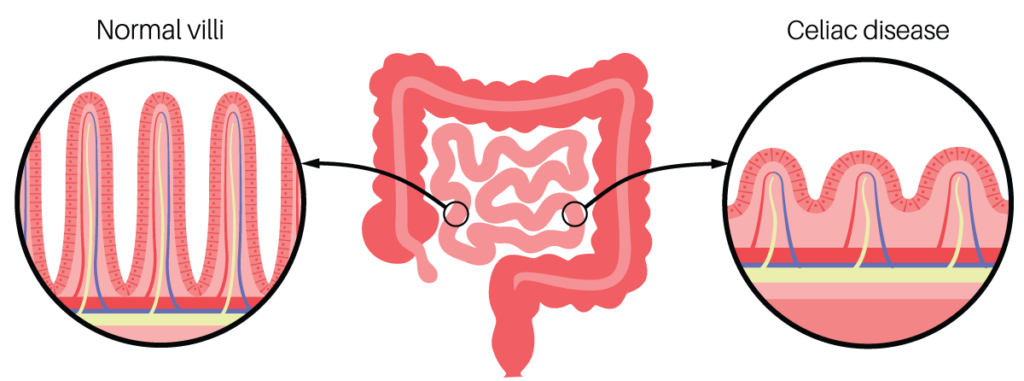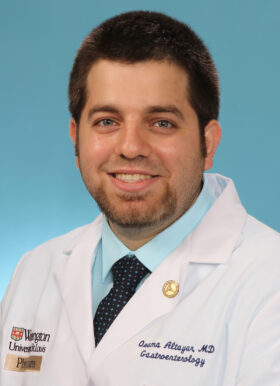Celiac disease, sometimes called celiac sprue or gluten-sensitive enteropathy, is an immune reaction to eating gluten, a protein found in wheat, barley and rye and some oats.
Gluten consumption can cause celiac disease at any age. Although some people are found to have celiac disease as infants, it is common for celiac disease to be diagnosed in adults who are in their 40s and 50s. If you have celiac disease, eating gluten triggers an immune response in your small intestine. When this reaction occurs over a prolonged period of time, you may find your small intestine unable to absorb certain nutrients (malabsorption). The intestinal damage often causes diarrhea, fatigue, weight loss, bloating and anemia, and can lead to further medical complications.

Celiac disease may be associated with other autoimmune conditions like type 1 diabetes, autoimmune thyroid diseases, dermatitis, and multiple sclerosis. If left untreated, it can lead to complications like iron deficiency anemia, nutritional deficiencies, osteoporosis and intestinal cancer. Patients are normally referred by their primary care physician after sharing stomach issues, or constant fatigue, or having nutritional deficiencies…these referrals are what led patients to Dr. Osama Altayar.
Friends Influenced Specialty
Osama Altayar, MD, Assistant Professor of Medicine, Division of Gastroenterology, went to medical school in Syria before coming to the United States for research. His residency soon followed and from 2016-2019 he was a Fellow at WashU. Getting to encounter celiac disease for the first time through a friend was an eye-opener and made him realize how challenging it is to avoid gluten. During his fellowship, Altayar recalls seeing relatively few patients with celiac disease to work with and now today’s medical fellows are requested training given the increase in celiac disease.
Altayar shares, “They know if they come to the Celiac Disease clinic…they’ll see on one day the same number of patients or more then I saw during my fellowship. And right now, they have a dedicated clinic at least one half day a week. For fellows in training this is a wonderful place for them to gain exposure.”
Celiac Disease Symptoms

Some 30% of people may be asymptomatic but through a blood test for the tissue transglutaminase antibody, they will test positive. Rarely, others may have a negative blood test but have a positive test from an internal endoscopy. Whether or not a person has symptoms of celiac disease, they are at risk for long-term medical complications. People living gluten-free must avoid foods with wheat, rye, and barley such as bread and beer. Ingesting even small amounts of gluten can trigger small intestine damage.
Here are some common symptoms:
- Abdominal pain – Gas and bloating – Constipation or Diarrhea
- Depression and anxiety – Fatigue – Headaches or migraines
- Anemia – Joint Pain – Thyroid issues
Celiac Treatments
The only treatment for celiac disease is to follow a strict gluten-free diet. To help you make the best decisions when learning of this diagnosis, it’s helpful to have a doctor and a dietician at hand. A dietician will be able to provide gluten-free dietary counseling, including education on label-reading not just for foods, but medications and supplements. WashU’s Celiac Disease Program is fortunate not only to have a dietician on hand to help patients, but also one whom herself has celiac disease.

“There’s no cure for celiac disease — but for most people, following a strict gluten-free diet can help manage symptoms and promote intestinal healing. If we can focus all the effort in one place…we can help more patients.”
Osama Altayar, MD
Assistant Professor of Medicine, Division of Gastroenterology
Altayar shares, “Our program was started in late 2020 and one of the major issues patients encountered was accessing healthcare quickly when the diagnosis was suspected. Celiac disease involves a diagnosis in multiple steps with a blood test followed by an upper endoscopy. What is important is while waiting for a diagnosis, patients should not begin the gluten-free treatment so to make sure not to alter the results.” As a result, patients often had to wait three to four months for a confirmation of their diagnosis. So, one of the first steps with any patients with suspected celiac is to get them into clinic within 1 to 2 weeks and get their endoscopy within 2 to 4 weeks. The team reaches out as soon as they receive the referral and often Dr. Altayar is making calls himself to assure patients they’ll take care of them promptly.
“The goal of the program is first to get the patient in quickly…and get the diagnosis for them and then have their own dietician that patients can also see in a short timeframe with the right treatment. We need to explain things to patients, and it requires time to work with them on their dietary preference,” shares Altayar.
Brooke Erwin, Registered Dietitian, Division of Gastroenterology, joined the program at the end of 2022 and is focused primarily on celiac disease. Before she joined the team, patients could wait up to eight weeks before learning how they will manage their diet. However, now Brooke typically sees them within a week or two once they’re referred to her. Brooke has a unique advantage per se to help patients as she too has a celiac disease diagnosis since childhood. Brooke helps guide patients on what goods to eat and even goes so far as to offer information to help patients on what options are best for patients to eat that are comparable to things they were enjoying with gluten.
Even though a gluten-free diet may sound like a simple intervention, it could be very challenging and there’s so much misinformation about it. The best people to teach patients about this are dieticians.
Altayar
Brooke also supports patients with dining-out options and how best to approach it without it becoming stressful. One of the hardest parts of helping is that restaurants may not always follow strict protocols. Calling ahead is often necessary so that when they’re eating out with friends and family, they’re not worried if they’ll be affected by a meal.

“We start by going through all the factual information…how the diet works, how to prepare food and then we get into the personal information…do they travel, enjoy eating out, love to cook so I can make it applicable to what they need. I try to balance quality of life within the gluten free diet to the best of my ability.”
Brooke Erwin, Dietician
In 2023, around 200 patients were treated by Altayar, and they are striving today to standardize the care provided for patients in the region. The Celiac Center team can provide valuable education for patients on how to avoid the anxiety and isolation that often comes with Celiac Disease, as well as how to enjoy going out with friends and family without that added worry. Since Dr. Altayar and the Celiac Center team treat patients with the same disease daily, patients feel confident that they are in good hands.